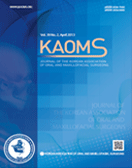Journal of the Korean Association of Oral and Maxillofacial Surgeons
- P-ISSN2234-7550
- E-ISSN2234-5930
- SCOPUS, KCI, ESCI
 ISSN : 2234-7550
ISSN : 2234-7550
Sedation with dexmedetomidine in elderly patients during dental surgery: a retrospective case series
Ryosuke Kita (Fukuoka University)
Seiji Kondo (Fukuoka University)
Abstract
Objectives: The number of elderly patients with systemic basal disease requiring invasive dental treatment has increased. Appropriate prediction of surgical invasiveness and combined use of psychosedation are thought to contribute to safe whole-body management. Dexmedetomidine (DEX) exhibits analgesic and anti-anxiolytic properties and causes mild respiratory depression. Studies regarding DEX use in elderly non-intubated patients are scarce. We aimed to use retrospective data to determine an effective dose of DEX to induce adequate sedation in elderly patients undergoing invasive dental surgery under local anesthesia. Materials and Methods: One hundred two patients aged 70 to 96 years were presumably appropriately controlled with sedation. DEX was administered at an initial loading dose of 2.0 to 3.1 μg/kg/hr for 10 minutes. We divided the patients into five groups by age and compared their blood pressures and heart rates. Results: In all five groups, blood pressure decreased suddenly at approximately 15 and 20 minutes after DEX administration. A marked decrease in blood pressure was noted in patients aged 75 to 79 years. Conclusion: For elderly patients aged 75 years and above, the initial loading dose of DEX needs to be reduced to lower than half that required for young and middle-age adults.
- keywords
- Dexmedetomidine, Sedation, Elderly
- Downloaded
- Viewed
- 0KCI Citations
- 0WOS Citations